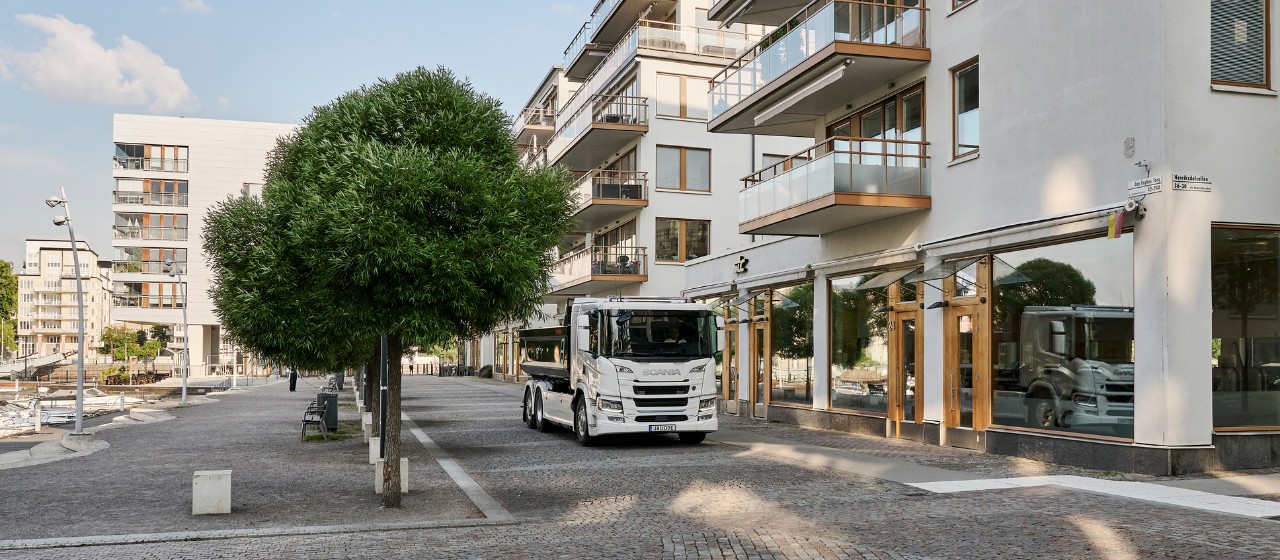
Why rethinking logistics can play a key role in preparing for autonomous and electrified vehicles.
26 APRIL 2023
The transport industry can benefit from rethinking transport and logistics operations, and the Scania Ventures Logistics team helps Scania’s customers prepare for a world of autonomous and electrified vehicles. Designing efficient logistics operations can enable more transparency and predictability in day-to-day transportation, says Markus van Horik, from Mobility Solutions.
Today, the transport industry is designed for the maximum optimization and utilization of vehicles built with a combustion engine. By only focusing on the optimization of vehicle and fleet utilization, it is also constructed in a way that makes it difficult to reduce carbon emissions. There is much to be gained by creating more efficient, transparent, and lean end-to-end flows.
To address this issue, Scania Ventures has developed a new service with the help of the experienced and knowledgeable personnel within the Scania Logistics team. The service helps Scania’s customers and its customers’ customers to meet some of the challenges in creating transparency and predictability in their logistics processes, while at the same time helping to prepare them for a world of autonomous and electrified vehicles.
It’s no easy challenge, but Markus, whose career includes logistics service development and supply chain consultancy, is up for the challenge. “I’m energised by the idea of making a change in the transport industry, and truly exploring what our vision of driving the shift towards sustainable transport can mean for Scania in terms of our products and services,” he says.
Logistics’ role in sustainable and efficient transport
Logistics has a huge role to play in driving the shift. Markus says the idea for the Scania Ventures Logistics project came from the realisation that the material flows for using the new autonomous and electrified technologies would have to be redesigned to be different from those that apply to older technologies. “The new technologies are not yet mature, so they will be so much less flexible than the products of today for quite a few years to come,” he explains.
“Today’s trucks can drive anywhere at any time of the year but that’s not yet the case for autonomous and electrified transports. It’s not just about the technology but also the legislation, different countries’ approaches and even their tech-readiness.”
However, Scania is well placed to respond to industry’s need for flow optimisation. “Our production division’s long experience of logistics and supply chain questions has left us with some very good practices that have commercial potential for external supply chains,” Markus explains.
“It’s an excellent example of how Scania Ventures can add value for customers in terms of reducing CO2 emissions and increasing cost control. From Scania’s point of view, we are creating revenue and reducing costs for the company using our existing assets.”
How the logistics service benefits customers
The Scania Ventures Logistics project is currently running pilots with several companies across industry. The team at Scania is designing entire logistics flows for producers. One of the key improvements involves consolidating materials that manufacturers get from their various suppliers.
By replacing the old model of ‘one supplier-one shipment’ with a consolidation of shipments in one location before sending on to the production facility, companies can reduce both carbon emissions and costs.
This helps satisfy growing regulatory and consumer demands for sustainable goods, plus the perennial need to make business more efficient. In the case of one European bicycle manufacturer that Markus’s team is working with, consolidating five separate truckloads into just one going to the production site may end up cutting the company’s CO2 emissions and transportation costs by as much as 20%. “Not only does redesigning these flows reduce environmental impact and operational cost,” adds Markus, “It also allows manufacturers to reduce their stock levels, which means they don’t need to have so much capital bound up. We are balancing flows in a better way that also has other knock-on benefits for their business.
Despite the current wider context of supply chain challenges that Scania and the wider industry are facing, Markus is delighted with the progress of the venture so far. “We already have some very satisfied customers, who’ve been inspired by our way of working. A lot of interested parties are getting in touch and we’re taking bookings every day,” he says.
“Today, we can see a massive opportunity for transforming logistics and transport, and in how we could help other customers utilise electrified and autonomous technologies at an earlier stage by taking control of the flows. It’s very exciting.”